Book4 Unit 2
大学英语新视野Book4 Unit2 原文
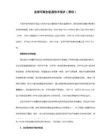
Indeed, it was a headache for Chaplin when he could no longer resist the talking movies and had to find "the right voice" for his Tramp. He postponed that day as long as possible: in Modern Times in 1936, the first film in which he was heard as a singing waiter, he made up a nonsense language which sounded like no known nationality. He later said he imagined the Tramp to be a college-educated gentleman who'd come down in the world. But if he'd been able to speak with an educated accent in those early short comedy movies, it's doubtful if he would have achieved world fame. And the English would have been sure to find it "odd". No one was certain whether Chaplin did it on purpose but this helped to bring about his huge success.
He also had a deep need to be loved — and a corresponding fear of being betrayed. The two were hard to combine and sometimes — as in his early marriages — the collision between them resulted in disaster. Yet even this painfully-bought self-knowledge found its way into his comic creations. The Tramp never loses his faith in the flower girl who'll be waiting to walk into the sunset with him; while the other side of Chaplin makes Monsieur Verdoux, the French wife killer, into a symbol of hatred for women.
(完整版)新人教版Book4Unit2WorkingtheLand课文
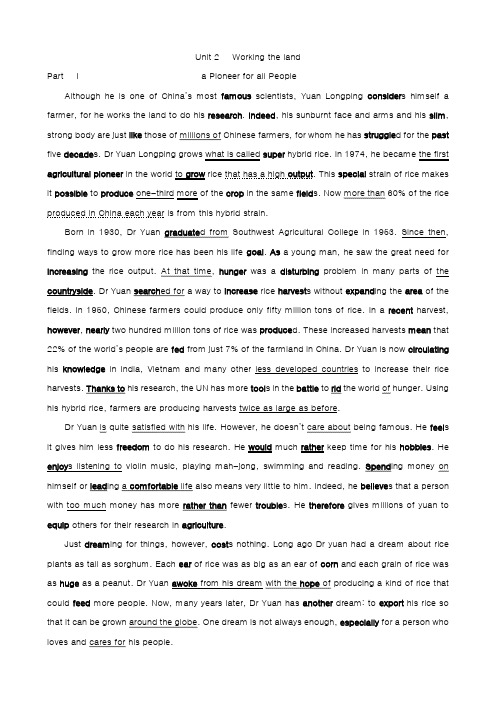
Unit 2 Working the landPart I a Pioneer for all PeopleAlthough he is one of China’s most famous scientists, Yuan Longping consider s himself a farmer, for he works the land to do his research. Indeed, his sunburnt face and arms and his slim, strong body are just like those of millions of Chinese farmers, for whom he has struggle d for the past five decade s. Dr Yuan Longping grows what is called super hybrid rice. In 1974, he became the first agricultural pioneer in the world to grow rice that has a high output. This special strain of rice makes it possible to produce one-third more of the crop in the same field s. Now more than 60% of the rice produced in China each year is from this hybrid strain.Born in 1930, Dr Yuan graduate d from Southwest Agricultural College in 1953. Since then, finding ways to grow more rice has been his life goal. As a young man, he saw the great need for increasing the rice output. At that time, hunger was a disturbing problem in many parts of the countryside. Dr Yuan search ed for a way to increase rice harvest s without expand ing the area of the fields. In 1950, Chinese farmers could produce only fifty million tons of rice. In a recent harvest, however, nearly two hundred million tons of rice was produce d. These increased harvests mean that 22% of the world’s people are fed from just 7% of the farmland in China. Dr Yuan is now circulating his knowledge in India, Vietnam and many other less developed countries to increase their rice harvests. Thanks to his research, the UN has more tool s in the battle to rid the world of hunger. Using his hybrid rice, farmers are producing harvests twice as large as before.Dr Yuan is quite satisfied with his life. However, he doesn’t care about being famous. He feel s it gives him less freedom to do his research. He would much rather keep time for his hobbies. He enjoy s listening to violin music, playing mah-jong, swimming and reading. Spend ing money on himself or lead ing a comfortable life also means very little to him. Indeed, he believe s that a person with too much money has more rather than fewer trouble s. He therefore gives millions of yuan to equip others for their research in agriculture.Just dream ing for things, however, cost s nothing. Long ago Dr yuan had a dream about rice plants as tall as sorghum. Each ear of rice was as big as an ear of corn and each grain of rice was as huge as a peanut. Dr Yuan awoke from his dream with the hope of producing a kind of rice that could feed more people. Now, many years later, Dr Yuan has another dream: to export his rice so that it can be grown around the globe. One dream is not always enough, especially for a person who loves and cares for his people.Part II Chemical or Organic Farming?Over the past half century, using chemical fertilizers has become very common in farming. Many farmers welcome d them as a great way to stop crop disease and increase production. Recently, however, scientists have been finding that long-term use of these fertilizers can cause damage to the land and, even more dangerous, to people’s health.What are some of the problems caused by chemical fertilizers? First, they damage the land by kill ing the helpful bacteria and pests as well as the harmful ones. Chemicals also stay in the ground and underground water for a long time. This affect s crops and, therefore, animals and humans, since chemicals get inside the crops and cannot just be wash ed off. These chemicals in the food supply build up in people’s bodies over time. Many of these chemicals can lead to cancer or other illnesses. In addition, fruit, vegetable s and other food grown with chemical fertilizers usually grow too fast to be full of much nutrition. They may look beautiful, but inside there is usually more water than vitamin s and mineral s.With these discover ies, some farmers and many customer s are beginning to turn to organic farming. Organic farming is simply farming without using any chemicals. They focus on keeping their soil rich and free of disease. A healthy soil reduce s disease and helps crops grow strong and healthy. Organic farmers, therefore, often prefer using natural waste from animals as fertilizer. They feel that this makes the soil in their fields richer in minerals and so more fertile. This also keeps the air, soil, water and crops free from chemicals.Organic farmers also use many other method s to keep the soil fertile. They often change the kind of crop in each field every few years, for example, growing corn or wheat and then the next year peas or soybeans. Crops such as peas or soybeans put important mineral s back into the soil, making it ready for crops such as wheat or corn that need rich and fertile soil. Organic farmers also plant crops to use different level s of soil, for example, planting peanuts that use the ground’s surface followed by vegetables that put down deep root s. Some organic farmers prefer planting grass between crops to prevent wind or water from carry ing away the soil, and then leaving it in the ground to become a natural fertilizer for the next year’s crop. These many different organic farming methods have the same goal: to grow good food and avoid damaging the environment or people’s health.。
高中英语必修四-unit2课文详解book4-unit2
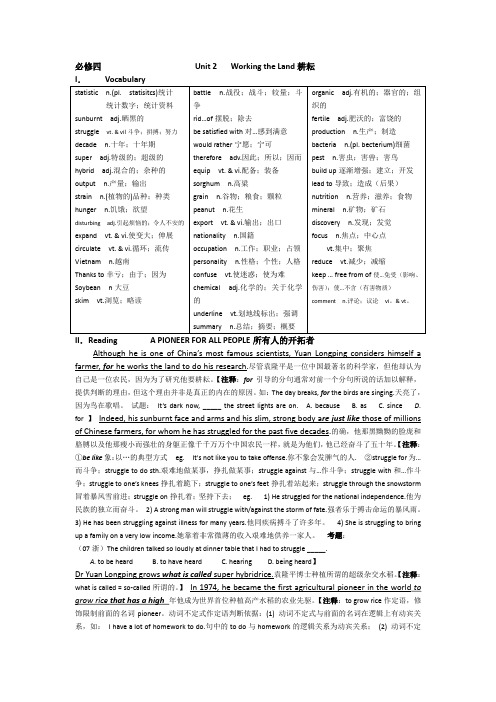
必修四Unit 2 Working the Land耕耘II.Reading A PIONEER FOR ALL PEOPLE所有人的开拓者Although he is one of China’s most famous scientists, Yuan Longping considers himself a farmer, for he works the land to do his research.尽管袁隆平是一位中国最著名的科学家,但他却认为自己是一位农民,因为为了研究他要耕耘。
【注释:for引导的分句通常对前一个分句所说的话加以解释,提供判断的理由,但这个理由并非是真正的内在的原因。
如:The day breaks, for the birds are singing.天亮了,因为鸟在歌唱。
试题:It’s dark now, _____ the street lights are on. A. because B. as C. since D. for 】Indeed, his sunburnt face and arms and his slim, strong body a re just like those of millions of Chinese farmers, for whom he has struggled for the past five decades.的确,他那黑黝黝的脸庞和胳膊以及他那瘦小而强壮的身躯正像千千万万个中国农民一样,就是为他们,他已经奋斗了五十年。
【注释:①be like象:以…的典型方式eg. It's not like you to take offense.你不象会发脾气的人. ②struggle for为…而斗争;struggle to do sth.艰难地做某事,挣扎做某事;struggle against与…作斗争;struggle with和…作斗争;struggle to on e’s knees挣扎着跪下;struggle to one’s feet挣扎着站起来;struggle through the snowstorm 冒着暴风雪前进;struggle on挣扎着;坚持下去;eg. 1) He struggled for the national independence.他为民族的独立而奋斗。
新标准大学英语BOOK4-unit2教案-李骠
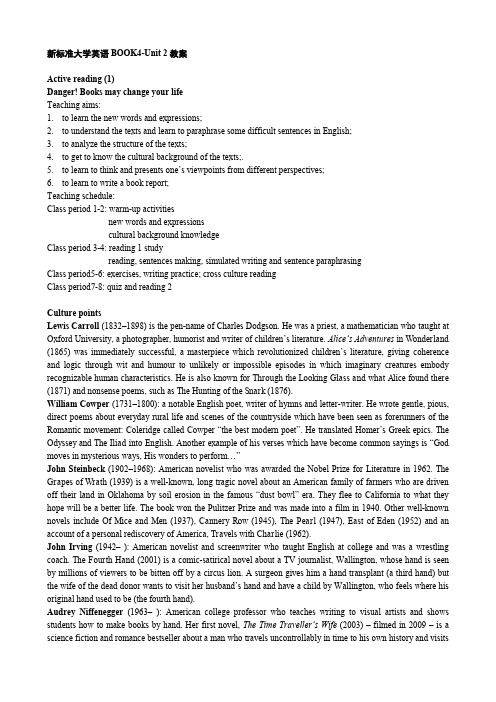
新标准大学英语BOOK4-Unit 2教案Active reading (1)Danger! Books may change your lifeTeaching aims:1.to learn the new words and expressions;2.to understand the texts and learn to paraphrase some difficult sentences in English;3.to analyze the structure of the texts;4.to get to know the cultural background of the texts;.5.to learn to think and presents one’s viewpoints from different perspectives;6.to learn to write a book report;Teaching schedule:Class period 1-2: warm-up activitiesnew words and expressionscultural background knowledgeClass period 3-4: reading 1 studyreading, sentences making, simulated writing and sentence paraphrasingClass period5-6: exercises, writing practice; cross culture readingClass period7-8: quiz and reading 2Culture pointsLewis Carroll (1832–1898) is the pen-name of Charles Dodgson. He was a priest, a mathematician who taught at Oxford University, a photographer, humorist and writer of children’s literature. Alice’s Adventures in Wonderland (1865) was immediately successful, a masterpiece which revolutionized children’s literature,giving coherence and logic through wit and humour to unlikely or impossible episodes in which imaginary creatures embody recognizable human characteristics. He is also known for Through the Looking Glass and what Alice found there (1871) and nonsense poems, such as The Hunting of the Snark (1876).William Cowper (1731–1800): a notable English poet, writer of hymns and letter-writer. He wrote gentle, pious, direct poems about everyday rural life and scenes of the countryside which have been seen as forerunners of the Romantic movement: Coleridge called Cowper “the best modern poet”. He translated Homer’s Greek epics. The Odyssey and The Iliad into English. Another example of his verses which have become common sayings is “God moves in mysterious ways, His wonders to perform…”John Steinbeck (1902–1968): American novelist who was awarded the Nobel Prize for Literature in 1962. The Grapes of Wrath (1939) is a well-known, long tragic novel about an American family of farmers who are driven off their land in Oklahoma by soil erosion in the famous “dust bowl” era. They flee to California to what they hope will be a better life. The book won the Pulitzer Prize and was made into a film in 1940. Other well-known novels include Of Mice and Men (1937), Cannery Row (1945), The Pearl (1947), East of Eden(1952) and an account of a personal rediscovery of America, Travels with Charlie (1962).John Irving (1942–): American novelist and screenwriter who taught English at college and was a wrestling coach. The Fourth Hand (2001) is a comic-satirical novel about a TV journalist, Wallington, whose hand is seen by millions of viewers to be bitten off by a circus lion. A surgeon gives him a hand transplant (a third hand) but the wife of the dead donor wants to visit her husband’s hand and have a child by Wallington, who feels where his original hand used to be (the fourth hand).Audrey Niffenegger (1963–): American college professor who teaches writing to visual artists and shows students how to make books by hand. Her first novel, The Time Traveller’s Wife (2003) – filmed in 2009 – is a science fiction and romance bestseller about a man who travels uncontrollably in time to his own history and visitshis wife in her childhood, youth and old age. His wife needs to cope with his absences and dangerous life while he travels. The story is a metaphor for distance and miscommunication in failed relationships.Paul Torday (1946– ): a British busines sman who worked for a company that repaired ship’s engines for many years. Salmon Fishing in the Yemen (2007) was his first novel. It is a political satire and comedy about a dull civil servant who becomes involved in a plan to populate the desert with Scottish salmon. Politicians manage the media to “spin” this as a plan they support in order to divert attention from problems in the Middle East. There are themes of cynicism and belief, and East-West culture clashes.Aleksandr Solzhenitsyn (1918–2008): a Russian writer who was imprisoned in Soviet labour camps in 1945; after eight years, he was exiled to Kazakhstan and not freed until 1956, when he became a teacher. In 1970 he was awarded the Nobel Prize for Literature but not receive it until 1974. He went to Germany, Switzerland and the USA, returning to Russia in 1994. His best known novels were based on his experiences as a prisoner and include: One Day in the Life of Ivan Denisovich (1962), Cancer Ward (1968), The Gulag Archipelago (1974–1978). His later works were about Russian history and identity.Graham Greene (1904–1991): a British novelist, short-story writer, playwright, travel writer and essayist. He wrote a number of thrillers (he called them ‘entertainments’) which dramatize an ambiguous moral dilemma, often revealing guilt, treachery, failure and a theme of pursuit. Greene was also a film critic and all of these novels have been made into films: Brighton Rock (1938), The Power and the Glory (1940), The Heart of the Matter (1948), The Third Man (1950), The Quiet American (1955), and Our Man in Havana (1958).E. M. Forster (1879–1970): a British novelist and writer of short stories and essays. He lived at different periods in Italy, Egypt and India and taught at Cambridge University. His best known novels include A Room with a View (1908), Howard’s End (1910), A Passage to India (1924) which have all been made into films. His writing about reading and writing includes a book of lectures, Aspects of the Novel (1927).Thomas Merton (1915–1968): an American Catholic writer, who was a Trappist monk in Kentucky. He wrote over 70 books, including many essays about Buddhism and a translation into English of the Chinese classic, Chuang Tse. He had a great deal to say about the meeting of Eastern and Western cultures and wrote many letters to writers, poets, scholars and thinkers. He read a lot in English, Latin, French and Spanish and said he always had at least three books which he was reading at any one time.William Blake (1757–1827): a British poet, artist and mystic, who read widely in English, French, Italian, Latin, Greek and Hebrew. He made many engravings to illustrate the work of such writers as Virgil, Dante and Chaucer, as well as his own poems. He stressed that imagination was more important than rationalism and the materialism of the 18th century and criticized the effects of the industrial revolution in England, but his work was largely disregarded by his peers. He is best known for his poetry in Songs of Innocence (1787) and Songs of Experience (1794). His belief in the oneness of all created things is shown in his much-quoted verse, “To see the world in a grain of sand / And a heaven in a flower, / Hold infinity in the palm of your hand / And eternity in an hour.”Clifton Fadiman (1904–1999): an American writer, radio and TV broadcaster and editor of anthologies. For over 50 years he was an editor and judge for the Book-of-the-Month Club. In 1960 he wrote a popular guide to great books for American readers, The Lifetime Reading Plan, which discusses 133 authors and their major work: the 1997 edition includes 9 authors from China.J. K. Rowling (1965–): British writer of the seven Harry Potter fantasy books. She studied French and Classics at Exeter University, before teaching English in Portugal and training to teach French in Scotland. The main idea about a school for wizards and the orphan Harry Potter came on a delayed train journey from Manchester to London in 1990. She began to write as soon as she reached London. Twelve publishersrejected the first book before Bloomsbury, a small London publisher, agreed to publish it. Later books have repeatedly broken all the sales records (as have some of the films). She is one of the richest women in the UK and a notable supporter of many charities.Language points1 Variety’s the very spice of life, / That gives it all its flavour … (Para 2)Spices are made from plants and added to food to give it its particular flavour or taste. The English proverb “Variety is the spice of life” (the proverb comes from Cowper’s poem) therefore means that variety gives life extra value and allows you to appreciate life in particular ways.2 We learn to look beyond our immediate surroundings to the horizon and a landscape far away from home. (Para 3)This means that through reading we learn to look beyond our immediate experience or familiar environment to things beyond our immediate experience, ie to completely different things that we can imagine and experience through books.3 When a baseball player hits a home run he hits the ball so hard and so far he’s able to run round thefour bases of the diamond, and score points not only for himself but for the other runners alreadyon a base. (Para 9)In the American game of baseball, the field of grass is diamond-shaped and has four bases (specific points marked around the diamond), round which players must run to score points. One team bats (ie team members take turns to hit the ball and run round the bases) and the members of the other team throw (pitch) the ball and, when it is has been hit, try to catch it or get it quickly to one of the four bases. If a batting player can hit the ball hard enough, he can run round all four bases before the other team can get the ball and thus score maximum points – with a home run. In the passage, a really good book is a home run.3 Choose the best answer to the questions.1 Why are we like Alice in wonderland when we read a book?(a) Because, like Alice, we often have accidents.(b) Because reading makes us feel young again.(c) Because reading opens the door to new experiences.(d) Because books lead us into a dream world.2 According to the writer, what is the advantage of reading over real life?(a) There is more variety in books than in real life.(b) We can experience variety and difference without going out of the house.(c) The people we meet in a book are more interesting than real people.(d) It’s harder to make sense of real life than a book.3 What do the seven novels listed in Paragraph4 have in common?(a) Their titles stimulate imagination.(b) They represent the best writing by British and American novelists.(c) They have become classics.(d) You can find all of them in any local library.4 At what moment in our lives do books become important?(a) As soon as we start reading.(b) When we start buying books to fill our shelves at home.(c) When we start listening to bedtime stories.(d) Only when we are ready for books.5 What claim did Merton make about the poems of William Blake?(a) They were similar to the works of the Greek writers and thinkers.(b) They helped him understand the meaning of life.(c) They created a sense of confusion.(d) They taught him a lot about modern culture.6 What is meant by a home-run book?(a) A book which is so good you are unable to put it down.(b) A book that the whole family can enjoy.(c) A children’s book that is read and appreciated by adults.(d) A book that hits hard like a home run in the game of baseball.Dealing with unfamiliar words4 Match the words in the box with their definitions.1 to make someone feel that they do not belong to your group (exclude)2 to fail to do something that you should do (neglect)3 to mention something as an example (cite)4 to be strong enough not to be harmed or destroyed by something (withstand)5 in most situations or cases (normally)6 to be about to happen in the future (await)5 Complete the paragraph with the correct form of the words in Activity 4.When I lived in Britain, one of my favourite radio programmes was ca lled “Desert Island Discs”. The format was always the same: Guest celebrities were asked to imagine they had been washed ashore on a desert island, and had to choose nine books – (1) excluding the Bible and Shakespeare, which they were already provided with – to take with them to the island, to help them (2) withstand the physical and mental isolation. I sometimes like to think which books I would take. (3) Normally, like most people, I don’t have much time for reading, and I could (4) cite dozens of books which I have never read but which I w ould like to. It’s an opportunity I have (5) awaited all my life, in fact. But what would I choose? Mostly novels, probably, but I wouldn’t (6) neglect to include a volume or two of poetry. My first choice, I think, would be Tolstoy’s War and Peace. I’ve never read it, but I’m ready to believe that it is one of the most marvelous books ever written.6 Replace the underlined words with the correct form of the words in the box.1 In a good novel, the writer and reader communicate with each other. (interact)2 I have to face up to the problem sooner or later. (confront)3 I read the book in one sitting and Mary did too. (likewise)4 E. M. Forster was one of the most important and respected British novelists of the 20th century. (influential)5 Do you believe that a work of literature can actually lead to social changes? (induce)6 Robert Burns was a great poet who wrote in the language variety spoken in Scotland. (dialect)7 The Time Traveller’s Wife is the story of a man who has a strange and inexplicable genetic disorder. (mysterious)7 Answer the questions about the words.1 If you have had a disconcerting experience, do you feel a bit (a) tired, or (b) confused?2 If you have a vista of something, can you (a) see or imagine it, or (b) go and visit it?3 Would you express great wrath by (a) smiling at someone, or (b) shouting at them?4 If you feel enchanted by a book, do you (a) like it a lot, or (b) not like it at all?5 Is a writer who is supremely talented (a) very good, or (b) quite good at his job?6 If reading fosters an understanding of certain problems, does it (a) help understanding, or (b) prevent it?7 If you are desperately trying to get a job, are you (a) trying very hard to get it, or (b) caring littlewhether you get it or not?8 Is a sensation (a) a certainty, or (b) just a feeling?Reading and interpreting8 Check () the writer’s main purpose in writing the passage.1 To show the reader how to read fiction.2 To suggest that fiction is more powerful than non-fiction.√ 3 To persuade the reader that reading can be a life-changing experience.4 To claim that books provide the meaning to life.5 To recommend some major novels to read.9 Work in pairs. Look at the statements from the passage and discuss the questions.1 … when we pick up a book we are about to enter a new world.Do you agree with this statement? Is this true of every book?I agree with this up to a point, but it is not true of every book because with some books you may already be very familiar with the world of those particular books so although you might read them, they wouldn’t take you to a new world.2 We’ll have experiences which are new, sometimes disconcerting, ma ybe deeply attractive, possibly unpleasant or painful, but never less than liberating from the real world we come from. How can reading be a “painful” experience? In what sense does reading “liberate” us from the real world?It is easy to imagine how reading could be a painful experience for some people: It depends on the book and on the reader’s background and personal ity. For instance, I can see that a story about bullying, might be painful to read if you were bullied when you were a child – it would remind you of the experience of being hurt.Reading can liberate us because in books we can have all sorts of wonderful and interesting experiences which would be impossible for us in the real world: we can travel to distant places or go anywhere in time, we can meet all sorts of people we probably wouldn’t meet anywhere else except in books.3 Reading books allows us to enjoy and celebrate this variety and difference in safety, and provides us with an opportunity to grow.How does this idea contrast with the title of the passage? In what way can a book help us “grow”? The word “Danger” in the title contrasts with this idea that reading is a safe experience. However, this is not a contradiction because experiences that would be dangerous in real life are quite safe when we read about them in books. The author seems to think that we grow in our minds with a better understanding and enriched imagination when we meet a wide variety of people and different situations in books. This vicarious experience in reading is a safe way to grow mentally and emotionally.4 To interact with other people’s lives in the peace and quiet of our homes is a privilege which only reading fiction can afford us.Do you agree? Is fiction really different from other types of writing?Well, I think this is true because in fiction we do interact with the characters, both positively (with characters we can identify with) and negatively (with characters we do not like or admire). But this doesn’t mean that we don’t interact with the writer in non-fiction. Surely all of us have the experience of feeling that we do interact with writers in newspaper or magazine articles and in some kinds of non-fiction which may be about science, for example. I suppose it depends on the style of the writing and on the personality of the writer (and of characters in fiction) and on us, as readers.5 We even understand … that we h ave more in common with other readers of books in other cultures than we might do with the first person we meet when we step out of our front doors.This suggests that people who read are different from people who don’t read. Do you agree? Well, I am not sure. I guess that people who read similar books, fiction or non-fiction, would share some common knowledge, experience and maybe feelings and they would probably talk about these when they know about each other’s reading habits. Of course, they wouldn’t ne cessarily have other things in common, just this particular connection with a certain kind of culture through reading. Maybe people in the street do not have to share this reading experience, so in that respect they are different, but they may be quite similar and share many cultural experiences in other ways –after all they live in the same place, probably speak the same language. So, I think it’s all a question of what sort of common experiences you are talking about. The more I think about it, the less I agree!6 From the bedtime story read by a parent to their child all the way through to the sitting room lined with booksin our adult homes, books define our lives.What do you understand by “books define our lives”?I suppose they would be those books – not many, surely? – which have made a great impact and remain so strong in our memories that do have a function of defining something in our lives. However, I think the author has exaggerated here. Books are not the only things that define our lives. People, places and special events define our lives too, so books are only one part which for some people have a great influence but for others maybe very little or none at all. We have to remember that some people simply don’t read books. Even some students on ly read what they have to read, nothing more than that!7 We cannot withstand the hunger to visit another world, to meet different people, to live other lives and to reflect on ourselves.Do you agree that we “live other lives” when reading? Or is this an exaggeration?I agree that we have strong imaginative experiences when we read. Maybe you can call this “living other lives” sometimes, but for me, anyway, this simply doesn’t happen very often and when it does happen it is only for a short time. I think the writer is exaggerating here to make the point that reading has importance in our imagination.8 Books may change your life.Is this a suitable title – and ending – for the passage? Why / Why not?Yes, I think it OK as a catchy title – it gets our attention, after all, and repeating it at the end makes a kind of coda like the ending of a piece of music which echoes something near the beginning. Also if you look carefully, it does have a note of caution by using “maybe” instead of “will”, so this title isn’t a definite promise, it’s more of an attractive idea, that your life may be changed through books, but might not be.Now discuss which of the above statements would have been more effective if backed up byexample(s).In fact, it seems that any of them could effectively be illustrated by examples, but if all of them were to be backed up with examples, the whole passage would be a lot longer and maybe too heavy with examples.If I had to choose just two statements which need supporting examples, I would say numbers three and six because I’d say the ideas about ‘growing’ through books and books ‘defining’ our lives are too vague without examples.Active reading (2)They were alive and they spoke to meBackground informationThis is from The Books in My Life by Henry Miller (1861–1980), an American novelist, writer and painter. Miller was born in New York, lived in Paris 1930–1939, and then in California. His best-known works blend fiction, autobiography, social criticism and mysticism: Tropic of Cancer (1934 published in France) describes his life and loves in Paris and because of its sexual frankness it was not published in the USA till 1961; Black Spring (1936) has ten autobiographical stories; Tropic of Capricorn (1939) is about his years with the Western Union Telegraph Company; The Colossus of Maroussi (1941), considered by some critics to be his best work, is a travel book about people from his stay in Greece.In The Books in My Life (1969) Miller looks at 100 books that influenced him. His list includes children’s books written originally for adults (eg Alice in Wonderland, The Arabian Nights, Greek Myths and Legends, Robinson Crusoe, The Three Musketeers); many French novels and poetry (eg by Balzac, Hugo, Giono, Nerval, Proust, Rimbaud, Huysmans, Maeterlinck), German novels (by Mann, Hesse, Dreiser) and the Chinese Lao Tse and Fenollosa’s The Chinese Written Character as a Medium for Poetry, besides work by American writers (Twain, Emerson, Thoreau, Whitman), Dostoievshy, Nietzsche, Joyce and writers on spiritual topics.Culture pointsAugust Strindberg (1849–1912): A Swedish playwright and a prolific writer of novels, short stories, satires, essays and poems, and a photographer, who tried various jobs before becoming assistant librarian at the Royal Library in Stockholm and established an experimental theatre. He is best known for his plays, including The Father (1887) and Miss Julie (1888), and for his vitality, vigour, and brilliant use of language. Miller cites Strindberg’s autobiographies, The Confession of a Fool (vol.2), a passionate love story and account of problems in his marriage, and The Inferno (vol.3), a study of his religious conversion, delusions and neuroses which reflect Strindberg’s periods of mental instability.Blaise Cendrars (1887–1961) is the pen name of Frédéric Sauser, a Swiss-born French novelist, shortstory writer, poet, and film-maker, who led a life of constant travel (he was born in an Italian railway train) doing various jobs in Russia, Europe, North and South America and Asia – he is said to have shoveled coal on steam trains in China. He lost his right arm fighting for France in World War I. His prose includes vivid, witty, action-packed novels, like Moravagine (1926), which describe travel and adventure, or works directly inspired by his own experience, like The Astonished Man (1945) and The Cut Hand (1946), and four volumes of memoirs. Miller admired his work and lists ‘virtually the complete works’ of Cendrars as influential reading.Rémy de Gourmont (1858–1915): a French writer of 50 books: essays, novels and poetry, with a strong interest in medieval Latin literature; as a critic he was admired by T. S. Eliot. He was a librarian at the National Library in Paris; later, a painful skin disease kept him largely at home. He was influential in the symbolist movement in literature. He claimed that a work of art exists only through the emotion it gives us. He asserted the need to get away from the unquestioning acceptance of commonplace ideas and associations of ideas, and believed it was necessary for thought to proceed by imagery rather than by ideas.Julius Caesar (110 BC–44 BC): a Roman statesman, known as a great military strategist. As a general he was famous for the conquest of Gaul (modern France and Belgium) which he added to the Roman Empire. He also made two expeditions to Britain, was governor of Spain and traveled in North Africa and Egypt. He was a good speaker and he wrote several books of commentaries and memoirs on Roman wars and military campaigns. Caesar’s writin g is often studied today by those who learn Latin.The Julius Caesar of literature: this phrase compares Cendrars with Caesar: both were men of action, travelers, adventurers, explorers, who somehow found time to read a lot and write books.Language points1 The fact, however, that in the past I did most of my work without the aid of library I look upon asan advantage rather than a disadvantage. (Para 1)This is irony. Miller is writing about the importance of reading and about key books in his life, but there is a paradox: Only recently has he been able to get all the books he has wanted all his life (ie he now has money, as a best-selling writer, to buy books) and, as a writer, he wrote books without the help of a library. He says that not having books wa s an advantage. The explanation is probably that Miller’s early writing was a mixture of autobiography and fiction, so he didn’t need to read other books or refer to them to do his own writing. The irony is that he is saying this in a book about the books the influenced him.2 A good book lives through the passionate recommendation of one reader to another. (Para 3)Miller thinks that a good part of the ‘life’ of a book is how one reader recommends it to another with enthusiasm, ie books are about sharing e xperience, not just the author’s experience in the book and the reader’s experience of reading it, but also the experience of word-of-mouth or face-to-face recommendation by other readers.3 And the better the man the more easily will he part with his most cherished possessions. (Para 4)This continues Miller’s thought that books are for sharing. A good person will share things he or she loves. In this case, such a person will give or lend favourite books and such generosity makes friends: When you give books you get friendship.4 If you are honest with yourself you will discover that your stature has increased from the mereeffort of resisting your impulse. (Para 6)Miller’s argument here is that you should not read everything, but that you should choose ve ry carefully and selectively. This means you should resist the temptation to read some things which are not really going to add to your knowledge or enjoyment (not every book will do this, only some). Here, he says that in this way, we grow (we “increase our stature”). That is, we grow by not reading many books. The implication is that if we choose the very best books and read these few really carefully we will get the best from them – and grow by such selection. Miller discusses 100 books which he things are such books.5 All on the side, as it were. (Para 7)Cendrars was a man of action who spent most of his time on travels and adventures. Surprisingly (you would think he did not have time), he read a lot in different languages and even wrote many books – this was in addition to his main activities.6 For, if he is anything, Cendrars, he is a man of action, an adventurer and explorer, a man who has known how to “waste” his time royally. (Para 7)Cendrars had a huge reputation as a man of action, travelling, having adventures and exploring different countries and yet he read a lot (he knew how to use the little time available to read). “Waste” is in quotes to show irony (reading isn’t a waste of time), that he reads in a royal manner (ie very thoroughly). The sentence structure here is quite French with the repetition of “he”.Reading and understanding2 Choose the best answer to the questions.1 What does Miller consider to have been an advantage during his writing career?(a) To have been able to read all the books he wanted.(b) To have grown up in a room full of books.(c) To have written without the aid of a library.(d) The fact that he never wanted to own any books.2 What did three stars on a book mean in the public library in Miller’s youth?(a) Young people weren’t allowed to read them.(b) They were the most popular books in the library.(c) They were intended for children.(d) They were more exciting than one-star books.3 Why does Miller hope the star system still exists in public libraries?(a) It is an efficient system which works well.(b) It discourages people from reading inappropriate books.(c) It makes people interested in reading.(d) It makes it easier for people to recognize books.4 Why do people lend books, in Miller’s opinion?(a) Because they feel the need to share their feelings.(b) It’s the best way to make a friend.(c) It’s less risky than lending money.(d) Because it’s not possible to possess a book for ever.5 According to Miller, what should you do when you find a book you want to read?(a) Pick it up and start reading.(b) Ask a friend for advice about the book.(c) Think about whether you really need to read it.(d) Only read it if it is original.6 What does Miller especially admire about Blaise Cendrars?(a) He had a very adventurous life.(b) He was a great writer.。
新人教版 Book 4 Unit 2 Working the Land 课文

Unit 2 Working the landPart I a Pioneer for all PeopleAlthough he is one of China’s most famous scientists, Yuan Longping consider s himself a farmer, for he works the land to do his research. Indeed, his sunburnt face and arms and his slim, strong body are just like those of millions of Chinese farmers, for whom he has struggle d for the past five decade s. Dr Yuan Longping grows what is called super hybrid rice. In 1974, he became the first agricultural pioneer in the world to grow rice that has a high output. This special strain of rice makes it possible to produce one-third more of the crop in the same field s. Now more than 60% of the rice produced in China each year is from this hybrid strain.Born in 1930, Dr Yuan graduate d from Southwest Agricultural College in 1953. Since then, finding ways to grow more rice has been his life goal. As a young man, he saw the great need for increasing the rice output. At that time, hunger was a disturbing problem in many parts of the countryside. Dr Yuan search ed for a way to increase rice harvest s without expand ing the area of the fields. In 1950, Chinese farmers could produce only fifty million tons of rice. In a recent harvest, however, nearly two hundred million tons of rice was produce d. These increased harvests mean that 22% of the world’s people are fed from just 7% of the farmland in China. Dr Yuan is now circulating his knowledge in India, Vietnam and many other less developed countries to increase their rice harvests. Thanks to his research, the UN has more tool s in the battle to rid the world of hunger. Using his hybrid rice, farmers are producing harvests twice as large as before.Dr Yuan is quite satisfied with his life. However, he doesn’t care about being famous. He feel s it gives him less freedom to do his research. He would much rather keep time for his hobbies. He enjoy s listening to violin music, playing mah-jong, swimming and reading. Spend ing money on himself or lead ing a comfortable life also means very little to him. Indeed, he believe s that a person with too much money has more rather than fewer trouble s. He therefore gives millions of yuan to equip others for their research in agriculture.Just dream ing for things, however, cost s nothing. Long ago Dr yuan had a dream about rice plants as tall as sorghum. Each ear of rice was as big as an ear of corn and each grain of rice was as huge as a peanut. Dr Yuan awoke from his dream with the hope of producing a kind of rice that could feed more people. Now, many years later, Dr Yuan has another dream: to export his rice so that it can be grown around the globe. One dream is not always enough, especially for a person who loves and cares for his people.Part II Chemical or Organic Farming?Over the past half century, using chemical fertilizers has become very common in farming. Many farmers welcome d them as a great way to stop crop disease and increase production. Recently, however, scientists have been finding that long-term use of these fertilizers can cause damage to the land and, even more dangerous, to people’s health.What are some of the problems caused by chemical fertilizers? First, they damage the land by kill ing the helpful bacteria and pests as well as the harmful ones. Chemicals also stay in the ground and underground water for a long time. This affect s crops and, therefore, animals and humans, since chemicals get inside the crops and cannot just be wash ed off. These chemicals in the food supply build up in people’s bodies over time. Many of these chemicals can lead to cancer or other illnesses. In addition, fruit, vegetable s and other food grown with chemical fertilizers usually grow too fast to be full of much nutrition. They may look beautiful, but inside there is usually more water than vitamin s and mineral s.With these discover ies, some farmers and many customer s are beginning to turn to organic farming. Organic farming is simply farming without using any chemicals. They focus on keeping their soil rich and free of disease. A healthy soil reduce s disease and helps crops grow strong and healthy. Organic farmers, therefore, often prefer using natural waste from animals as fertilizer. They feel that this makes the soil in their fields richer in minerals and so more fertile. This also keeps the air, soil, water and crops free from chemicals.Organic farmers also use many other method s to keep the soil fertile. They often change the kind of crop in each field every few years, for example, growing corn or wheat and then the next year peas or soybeans. Crops such as peas or soybeans put important mineral s back into the soil, making it ready for crops such as wheat or corn that need rich and fertile soil. Organic farmers also plant crops to use different level s of soil, for example, planting peanuts that use the ground’s surface followed by vegetables that put down deep root s. Some organic farmers prefer planting grass between crops to prevent wind or water from carry ing away the soil, and then leaving it in the ground to become a natural fertilizer for the next year’s crop. These many different organic farming methods have the same goal: to grow good food and avoid damaging the environment or people’s health.。
Book 4 Unit 2 Grammar 动名词作主语、宾语

Book 4 Unit 2 Grammar 动名词作主语、宾语定义:动名词是由动词+ing变化而来,它仍保留着动词的某些特征,具有动词的时态和语态的变化,但没有人称和数的变化。
用以表达名词所不能表达的较为复杂的意念。
动名词的名词特征表现在它可在句子中当名词来用,作主语、宾语、表语、定语。
它也可以被副词修饰或者支配宾语。
作用:动名词具有名词的性质,因此在句中可以作主语、表语、宾语、定语等。
动名词的形式:(其否定形式是在v-ing前面加not)1.动名词的一般式所表示的动作通常是一般性动作,即不是明确地发生在过去、现在或将来的动作,或者是表示与谓语动词所表示的动作同时发生的动作。
We are very interested in collecting stamps.我们对集邮很感兴趣。
His coming will be of great help to us . 他来对我们大有帮助。
2.动名词的完成式所表示的动作或状态在谓语动词之前完成或结束。
He regrets not having taken part in the work. 他后悔没有参加这项工作。
We were praised for having finished the work ahead of time.我们因提前完成了这项工作而受到了表扬。
3.动名词的否定式是在v-ing前面加not。
He hated himself for not having work hard. 他悔恨自己没有用功。
He felt sorry for not having done the work well. 他为没有把工作做好感到难过。
4.动名词的被动式:当动名词的逻辑主语是行为承受者时,用被动语态。
如:I like being given harder work. 我喜欢接受难点的工作。
She is proud of being admitted into the university. 她为被大学录取而感到自豪。
人教版英语Book4 Unit2 语法ing形式作主语和宾语

• 有些短语以to 结尾,但后面需加ing形式作宾语, • 如be/ get used to (习惯于), look forward to (盼望),pay attention to (注意), devote...to(把...奉献 给 )等
• 其他需加-ing形式作宾语的短语: • • • • • • • • • feel like(喜欢), be busy (in) (忙于), be tired of(厌烦), be fond of(喜欢), be afraid of(害怕), think of / about(考虑), keep on(继续), insist on(坚持), be good at(擅长), give up(放弃), can’t stand (无法忍受) spend… (in) doing, succeed in doing(成功做), have difficulty / trouble (in) doing (做…有麻烦) can’t help doing (情不自禁做)
• • • •
Please go on doing _____(do) the same exercise. to do (do) the other exercise. Please go on _____ Stop _______ talking (talk), please . to have He stopped __________(have) a rest after a tiring walk.
It is worth / worthwhile watching this movie. 2.玩电脑游戏是浪费时间的。 It is a waste of time playing the computer games. 3.说这样的话是没有用的。 It is no use saying such a thing.
Book 4 unit 2 cloze活宝三人组

XIII Cloze
The Three s n. 傀儡;喜剧里的配角或丑角(stooge的复数)
It is doubtful that there was a more successful comedy team in the 20th century than Three Stooges. Larry, Moe, and Curly became famous for their many short movies featuring extraordinary comedy. In their movies, they found many ways of showing off funny actions. They attracted large audience and received a lot of applause. However, their movies also sparked criticism. Some people who didn't like the Three Stooges claimed they were too violent. In a TV interview Moe and Larry were roused to defend themselves. Their coarse brand, they said, shouldn't be taken seriously. It was just "cartoon violence". The Stooges got their name and their start in an act called Ted Healy and his Stooges. This act began paving the way for their exceedingly successful career. Originally, the team was composed of Larry, Moe and Shemp. However, Shemp left for a career in more serious movies. When Shemp left, Curly took his place. Shemp's clumsy character returned in 1946 after Curly suffered a stroke.
高中英语 Book 4 Unit 2重点短语讲解 新人教版必修4
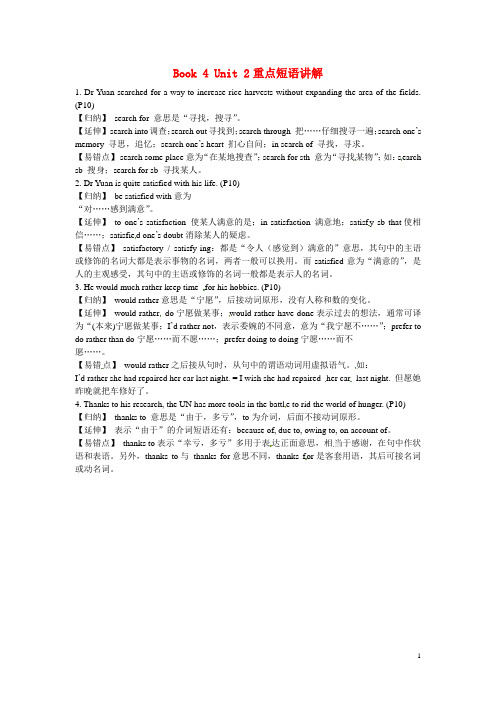
Book 4 Unit 2重点短语讲解1. Dr Yuan searched for a way to increase rice harvests without expanding the area of the fields. (P10)【归纳】search for 意思是“寻找,搜寻”。
【延伸】search into调查;search out寻找到;search through 把……仔细搜寻一遍;search one’s memory 寻思,追忆;search one’s heart 扪心自问;in search of 寻找,寻求。
【易错点】search some place意为“在某地搜查”;search for sth 意为“寻找某物”;如:s earch sb 搜身;search for sb 寻找某人。
2. Dr Yuan is quite satisfied with his life. (P10)【归纳】be satisfied with意为“对……感到满意”。
【延伸】to one’s satisfaction 使某人满意的是;in satisfaction 满意地;satisf y sb that使相信……;satisfie d one’s doubt消除某人的疑虑。
【易错点】satisfactory / satisfy-ing:都是“令人(感觉到)满意的”意思,其句中的主语或修饰的名词大都是表示事物的名词,两者一般可以换用。
而satisfied意为“满意的”,是人的主观感受,其句中的主语或修饰的名词一般都是表示人的名词。
3. He would much rather keep time for his hobbies. (P10)【归纳】would rather意思是“宁愿”,后接动词原形,没有人称和数的变化。
【延伸】would rather do宁愿做某事;would rather have done表示过去的想法,通常可译为“(本来)宁愿做某事;I’d rather not,表示委婉的不同意,意为“我宁愿不……”;prefer to do rather than do宁愿……而不愿……;prefer doing to doing宁愿……而不愿……。
新课标人教版必修四Book4 Unit2 Language points
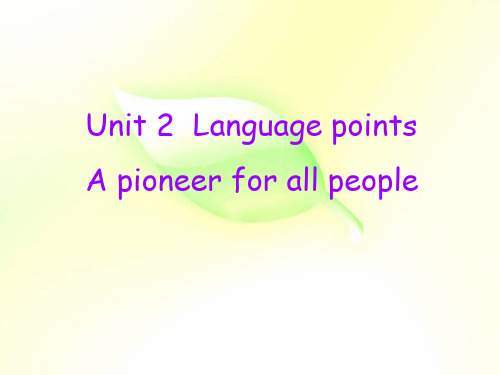
4. Thanks to his research, the UN has more tools in the battle to rid the world of hunger. thanks to = because of ; owing to ①多亏了史密斯大夫,我现在又能走路了。 Thanks to Dr. Smith, I can walk around again now. ②Thanks to his carelessness, we suffered a great loss. 由于他的粗心,我们遭受了巨大损失。 ③由于他的愚蠢,我们赢了这场比赛。 It was thanks to his stupidity that we won the game. rid…of … 使…摆脱 /清除… ③She is trying to rid herself of a dependence on drugs. 她正努力使自己摆脱对药物的依赖。 ④You should rid yourself of the bad habits. 你应该改掉自己的坏习惯。 get rid of 摆脱、除去
Unit 2 Language points
A pioneer for all people
重点词汇与句型 1. …, for whom he has struggled for the past five decades. 经常用于现在完成时的时间状语有:already, yet, recently , so far , up to now , since……, in the past … years 等等. ①在过去的十年里,物价平稳地上升。 Prices have risen steadily during/in the past decade. ②过去的十年里,中国发生了巨大的变化。 Great changes have taken place in China in the past decade. struggle vi. 搏斗, 挣扎, 努力, 拼搏 They were struggling to get out of the burning car. [搭配] struggle against 与…斗争,为反对…而斗争, struggle for 为争取…而斗争 struggle to one’s feet 挣扎着站起来 He has been cancer for many struggling against/with years. He has been success in his career struggling for
凤凰职教book4Unit2教案
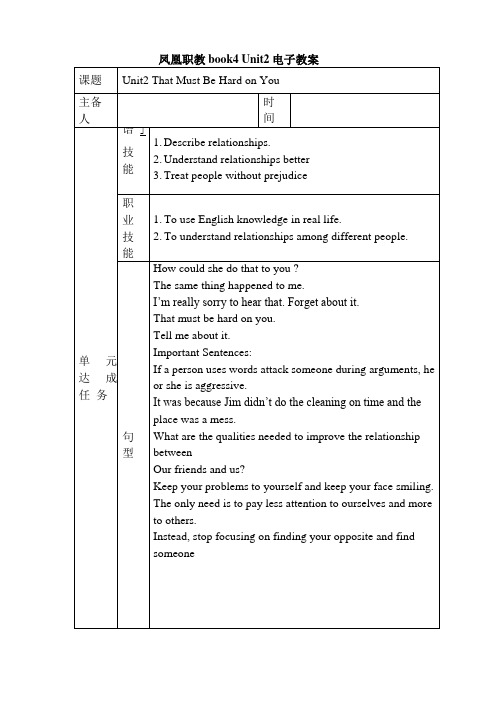
凤凰职教book4 Unit2电子教案Take students to read the picute of Parti and guesswhat’s happening to Jim.Listen to the conversation and circle what Jim is upset about.Then correct the answer.Listen again and complete the Part2 True or False.And tell the reasons to the class.Try to encourage to complete the part3 by themselves by using theinformation they have got in the before Twice’s listening.教学反思Stepl RevisionHave a dictaionSome important words: aggressive, gentle,patient,amazing, fun, bossy .....Students can describe their partners by the words we have learned last class.Step2 ListeningFirst listening:Take students to learn the three sentences and to know their chinese meanings.Listen to the tape recorder and find out the problem mentioned in each item.(Tell students to catch the key information when they are listening and take some notes.)Second Listening:Read the five sentences and try to complete the conversations with them.Ask two students to practise the conversations .Listen again and check their answers.some useful phrases:talk behind my back, all sorts of lies, ask him for help. Step3 Conversation StrategUnderstandingGenuine compassionMake you be in a similar situationBe a good listenerStep4. Work with a partner. Role-play the following e the conversation strategy in Acivity5. Situation 1: ......Situation 2: ......Situation 3: ......教学反思Ask some students to read the passageA one by one.Students can express that how to be friendly and charming by their own words. Complete the exercise 2 and check the answers with others.Step3 DiscussionWhat else can be done to improve friendships?Divide the students into several groups and talk with each other.教学反思different from themselves is a great relationship match. Be different from 与。
Book4 Unit2知识梳理学案
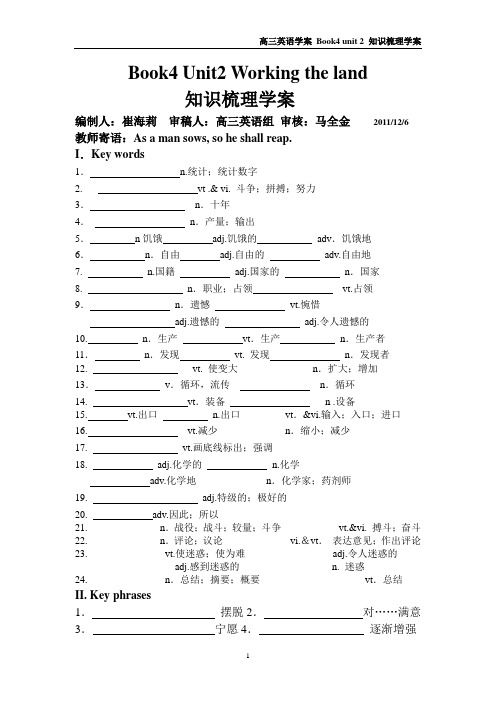
Book4 Unit2 Working the land知识梳理学案编制人:崔海莉审稿人:高三英语组审核:马全金2011/12/6教师寄语:As a man sows, so he shall reap.I.Key words1.n.统计;统计数字2. vt .& vi. 斗争;拼搏;努力3.n.十年4.n.产量;输出5.n饥饿adj.饥饿的adv.饥饿地6.n.自由adj.自由的adv.自由地7. n.国籍adj.国家的n.国家8. n.职业;占领vt.占领9.n.遗憾vt.惋惜adj.遗憾的adj.令人遗憾的10. n.生产vt.生产n.生产者11.n.发现vt. 发现n.发现者12. vt. 使变大_______________n.扩大;增加13.v.循环,流传n.循环14. vt.装备n .设备15. vt.出口n.出口_________vt.&vi.输入;入口;进口16. vt.减少_____________ n.缩小;减少17. vt.画底线标出;强调18. adj.化学的n.化学adv.化学地_____________n.化学家;药剂师19. adj.特级的;极好的20. adv.因此;所以21. ______________n.战役;战斗;较量;斗争___________ vt.&vi. 搏斗;奋斗22. ______________n.评论;议论____________ vi.&vt.表达意见;作出评论23. _______________vt.使迷惑;使为难________________ adj.令人迷惑的_________________adj.感到迷惑的________________ n. 迷惑24. _____________ n.总结;摘要;概要_____________________vt.总结II. Key phrases1.摆脱2.对……满意3.宁愿4.逐渐增强5.导致6.集中在……上7.使……免受(影响、伤害等)8.寻找9.太多10. 希望11. 过去常常12. 坚持III. Key sentences.1. ,what do you do to grow them?如果这样的话,你做了些什么来种植这些植物?2. Dr. Yuan Longping grows super hybrid rice. 袁隆平博士种植的是被称为“超级杂交水稻”的稻种。
高中英语Book 4 Unit 2 Working the Land Reading , Speaking and Writing
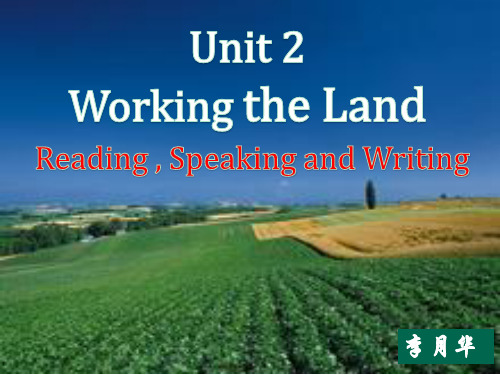
Useful words & expressions
any pictures? attractive logo? any slogan sentence? grammar spelling mistakes? good expressions learnt from language this class? attractive and brief sentences?
because…
If I have a choice I’ll
The advantages are… choose…
It's certain to be...
What’s the advantage
It’s more expensive but… of…?
You’ll taste the difference I’d rather…
picking and sightseeing garden
Useful Expressions for Speaking
producers
Customers
It’s better to …
I’d prefer…because…
This is good value
I don’t like…because…
when…
It’s a great pity that…
cherry
strawberry
kiwi frking and sightseeing garden
Book4unit2Extendedreading课件ppt
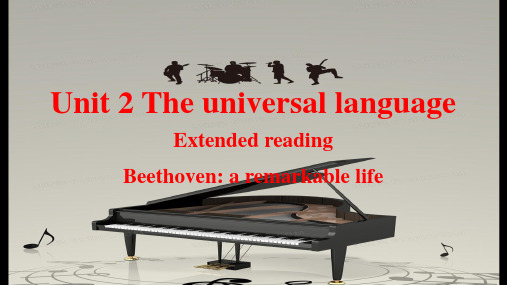
studying music day and night
enjoying a reputation as a wonderful young musician
Reading
Para. 3
Please discuss the second question in partA with your partners.
Lead-in
• 1. What kind of disability did Beethoven suffer from? • 2. Did he give in to fate? How did he overcome that
disability? • 3. Why is he “remarkable”?
Unit 2 The universal language
Extended reading Beethoven: a remarkable life
Lead-in
What do they have in common? Despite their physical disabilities, they achieve success with great determination.
What qualities lead to Beethoven’s great success?
Qualities of Beethoven
determinatio
optimism n
desire
diligence
Qualities of Beethoven
talent
creativity
passion
Part 2 Paras. 2–3
9
Beethoven’s life journey before his latetw(2e)nties Beethoven’s attitudes in the face oft(h3e)loss of hearing
剑桥国际少儿英语book4-Unit2-课件-

18
Practice—P17--#6
Pair work — Say and guess
19
Practice
Activity Book—P17 Unit1-Test A and B listening
20
Nov 9.18
38
Practice—P21—Lock Key Before listening
Where did the story happen?
After 1st listening What does the note say? Why does the coach shout? What is Mr.Sweep doing?
24
Presentation
P18--#7,8.9 • badly adv.差地 • well adv.厉害地 • carefully adv.仔细地 • quickly adv.快速地 • slowly adv.慢地 • loudly adv.大声地 • quietly adv.安静地
25
Presentation
剑桥国际少儿英语book4-Unit2 课件
Oct12,18
2
Warm Up
Who is the king of the forest? Who knows more words?
3
Review
Unit1—Lock and Key Unit1-Activity book Oral homework checking
21
Warm Up
1.Unit1-Test A and B讲解 3.listening practice
人教版高中英语必修四(Book 4 Unit 2)
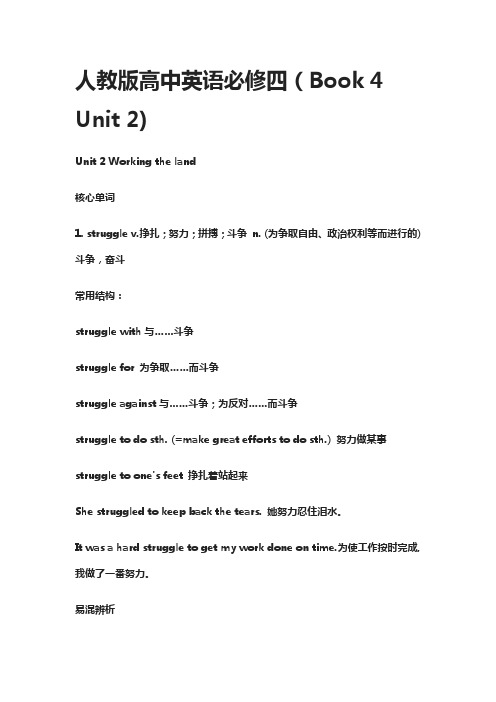
人教版高中英语必修四(Book 4 Unit 2)Unit 2 Working the land核心单词1. struggle v.挣扎;努力;拼搏;斗争n. (为争取自由、政治权利等而进行的)斗争,奋斗常用结构:struggle with与……斗争struggle for 为争取……而斗争struggle against与……斗争;为反对……而斗争struggle to do sth. (=make great efforts to do sth.) 努力做某事struggle to one's feet 挣扎着站起来She struggled to keep back the tears. 她努力忍住泪水。
It was a hard struggle to get my work done on time.为使工作按时完成, 我做了一番努力。
易混辨析struggle/fightstruggle指较长时间的、激烈的斗争,往往指肉体及精神上的战斗。
fight意为"搏斗,打斗,打架",表示"斗争"时,包含体力和勇猛的因素。
(1)单项填空The working people have never stopped their struggle_______________unfair treatment.A. againstB. forC. fromD. to解析:选A。
struggle against意为"同……作斗争";struggle for意为"为了……而斗争"。
(2)完成句子①我们应当帮助那些仍在为独立而斗争的人们。
We should help those who are still struggling for independence .②他们得和各种各样的困难作斗争。
They had to struggle with/against all kinds of difficulties(3)根据括号内的汉语提示补全下面句子。
大学英语精读第四册Unit2课后答案

大学英语精读第三版第四册Book4 Unit2答案上海外语教育出版社董亚芬主编1) bull2) horse3) dog4) dog5) tiger6) tiger7) lioness8) goose9) fowl10) cock11) duck1) practical2) scarcity3) external4) raise5) rise6) waste7) deficiency8) minimum9) draw10) insufficient11) reduce12) freeze1) fundamental2) deposited3) in the form of4) in good condition/in condition5) currencies6) resources7) lowering8) conceived9) Rhythm10) reserve11) romantic12) productivity13) dependent14) internal1) mature2) reserve3) deposit/deposit enough money4) currency5) ample6) fundamental7) given birth to8) somewhat9) an excess10) expended11) safeguard12) conceive1) drew on/draws on2) depend on3) slowing down4) put on5) turn down1) The country is trying to be/become less dependent on foreign aid.2) It amused us to see the actor's beard fall off.3) The rhythm of life is made up of a cycle of birth, youth, maturity, and death.4) Conservation of our mineral resources is highly important because they can never be replenished.5) Parking spaces in this city are scarce on Saturdays.1) man-eating2) earth-shaking3) body-building4) labor-saving5) fact-finding6) record-breaking7) tone-setting8) paper-cutting1) biochemistry: the science that deals with the chemical processes of living animals and plants; biological chemistry2) biocide: any substance poisonous to life3) bioconversion: the conversion of biological waste, garbage, and plant material into energy, fertilizer, and other useful products4) biophysics: the branch of biology which applies the laws of physics to explain the phenomena of biology5) ecoactivity: any project or undertaking to combat pollution or improve the quality of the environment6) ecocatastrophe: a large-scale or world-wide disaster resulting from uncontrolled use of pollutants7) ecocide: the destruction of the earth's environment or ecology through the uncontrolled use of pollutants8) ecospecies: a group of organisms only somewhat fertile with organisms of related groups, usually considered equivalent to a species1) All children in that country are2) all her life/her whole life3) Whole Indian tribes in the region were killed off.4) the whole staff/all the staff5) all the time/the whole time6) this whole business/all this business1) in the case of Tom: he was ill.2) A case in point is Dujiangyan, which was built about 2000 years ago.3) in the case of my two college sons, they try to live on their parents as long as possible.4) A case in point is the successful launching of space shuttles.5) A case in point is the chimp, who can learn to paint like a small child.1) He does not lend his books to everybody.2) She is not always so cooperative.3) Not all his stories make interesting reading.4) This plant is not to be found everywhere.5) The exhibits are not all of them worth looking at.1) go round2) romantic3) fundamental4) dependent6) abundant7) deposited8) scarce9) slowing down10) pull through11) draw on12) in good condition13) give birth to1) with2) on3) future4) as5) to6) cycles7) rhythms8) from9) body11) studying12) over13) that14) effects15) direction16) take17) one翻译1) 比尔已是个成熟的小伙子,不再依赖父母替他做主。
- 1、下载文档前请自行甄别文档内容的完整性,平台不提供额外的编辑、内容补充、找答案等附加服务。
- 2、"仅部分预览"的文档,不可在线预览部分如存在完整性等问题,可反馈申请退款(可完整预览的文档不适用该条件!)。
- 3、如文档侵犯您的权益,请联系客服反馈,我们会尽快为您处理(人工客服工作时间:9:00-18:30)。
必修4 Unit 2 A PIONEER FOR ALL PEOPLEAlthough he is one of China's most famous scientists, Yuan Longping considers 1.(him) a farmer, for he works the land 2. (do) his research. Indeed, his sunburnt face and arms and his slim, strong body are just like those of millions of Chinese farmers, 3. whom he has struggled for the past five decades. Dr Yuan Longping grows 4. is called super hybrid rice. In 1974, he became the first agricultural pioneer in the world 5. (grow) rice 6.has a high output. This special strain of rice makes7. possible 8. (produce) one-third more of the crop in the same fields. Now more than 60% of the rice 9. (produce) in China each year 10. (be) from this hybrid strain.Born into a poor farmer's family in 1930, Dr Yuan graduated from Southwest Agricultural College in 1953. Since then, 11. (find) ways to grow more rice has been his life goal. 12. a young man, he saw the great need for 13. (increase) the rice output. At that time, hunger was a 14. (disturb) problem in many parts of the countryside. Dr Yuan searched 15. a way to increase rice harvests without 16. (expand) the area of the fields. In 1950, Chinese farmers could produce only fifty million tons of rice. In a recent harvest, however, nearly two hundred million tons of rice was produced. These 17. (increase) harvests mean that 22% of the world's people 18. (be) fed from just 7% of the farmland in China. Dr Yuan is now circulating his knowledge in India, Vietnam and many other less19. (develop) countries to increase their rice harvests. Thanks 20. his research, the UN has more tools in the battle to rid the world 21. hunger. 22. (use) his hybrid rice, farmers are producing harvests 23. (two) as large as before.Dr Yuan is quite 24. (satisfy) with his life. However, he doesn't care about 25. (famous). He feels it gives him less 26. (free) to do his research. He would much rather keep time for his hobbles. He enjoys listening 27. violin music, playing mah-jong, 28. (swim) and reading. Spending money on himself or 29. (lead) a comfortable life also means very little to him. Indeed, he believes that a person with too much money has more rather than 30. (few) troubles. He therefore gives millions of yuan to equip others for their research in agriculture.Just 31. (dream) for things, however, 32. (cost) nothing. Long ago Dr yuan had a dream about rice plants as tall as sorghum. Each ear of rice was as big as an ear of corn and each grain of rice was as huge as a peanut. Dr Yuan awoke from his dream with the hope of producing a kind of rice 33. could feed more people. Now, many years later, Dr Yuan has another dream: to export his rice so that it can be grown around the globe. One dream is not always enough, especially for a person 34. loves and cares for his people.CHEMICAL OR ORGANIC FARMING?Over the past half century, 1. (use) chemical fertilizers has become very common in farming. Many farmers welcomed them as a great way 2. (stop) crop disease and increase production. Recently, however, scientists 3. (find) that long-term use of these fertilizers can cause damage 4. the land and, even more 5. (danger), to people's health.What are some of the problems 6. (cause) by chemical fertilizers? First, they damage the land by killing the helpful bacteria and pests as well as the harmful 7. . Chemicals also stay in the ground and underground water for a long time. This affects crops and, 8. , animals and humans, since chemicals get inside the crops and cannot just be washed 9. . These chemicals in the food supply build 10. in people's bodies over time. Many of these chemicals can lead 11. cancer or other 12. (ill). In addition, fruit, vegetables and other food 13. (grow) with chemical fertilizers usually grow 14. fast to be full of much nutrition. They may look beautiful, 15. inside there is usually more water 16. vitamins and minerals.17. these discoveries, some farmers and many customers are beginning to turn 18. organic farming. Organic farming is simply farming 19. using any chemicals. They focus 20. keeping their soil rich and free of disease. A healthy soil reduces disease and helps crops grow strong and healthy. Organic farmers, therefore, often prefer using natural waste from animals 21. fertilizer. They feel that this makes the soil in their fields 22. (rich) in minerals and so more fertile. This also keeps the air, soil, water and crops free from chemicals.Organic farmers also use many other methods to keep the soil fertile. They often change the kind of crop in each field every few years, 23. example, growing corn or wheat and then the next year peas or soybeans. Crops such 24. peas or soybeans put important minerals back into the soil, 25. (make) it ready for crops such as wheat or corn 26. need rich and fertile soil. Organic farmers also plant crops to use different levels of soil, for example, planting peanuts that use the ground's surface 27. (follow) by vegetables that put down deep roots. Some organic farmers prefer planting grass between crops 28. (prevent) wind or water from carrying 29. the soil, and then 30. (leave) it in the ground to become a natural fertilizer for the next year's crop. These many different organic farming methods have the same goal: to grow good food and avoid 31. (damage) the environment or people's health.。
